- Home
- Patrick O'Brian
Testimonies Page 2
Testimonies Read online
Page 2
The others did not join in any more, though the old lady hovered by, looking at her son with a proud smile: I presumed he was her son, although there was no likeness between them. I was talking about the length of the journey (an unusually tedious train and several changes) when the door opened and a young woman came in, carrying a pile of clothes. I broke off, and the young man said, “Bronwen, here is the gentleman from Hafod.”
She was obviously surprised and a little put about: her hand went up to her hair. But she put the clothes down on the dresser and came forward to meet me with none of the awkwardness that I should have shown in the same case. It was charming to see her come the length of the room: she was about thirty—not a girl—but she held herself with adolescent grace. She was extraordinarily good-looking. We shook hands, and she offered me a cup of tea; I refused, saying that I had just come down in the hope of being allowed to buy some milk and eggs. She spoke the purest English of the four, and I noticed that she stood with her hands folded in front of her while I was speaking; it was a flattering attitude—it gave the impression that what was being said was of great interest and importance.
We talked a little more and then, accompanied by the unwilling, horror-struck youth with a hurricane-lamp to show me the way, I carried my eggs and milk up the hill to Hafod.
It was strange that I had not been able to hit the right path; nothing could have been plainer, and at least once on my way down I must have crossed it. I said something of this nature to the youth, choosing easy words and speaking distinctly; but he made no reply. Near the door of Hafod he left me suddenly, with a guttural laugh.
After my supper I pushed the crocks to one side and sat in front of the stove—it was drawing well and I had its doors open. The chair was comfortable, and as I sat there smoking, I had a very real sense of happiness. A good meal and creature comfort after a long and tiring day had something to do with it, but more came from a recollection of that good family down there at the farm. Perhaps it was because my own life had had so little domesticity in it that I appreciated it as much as I did, but I am sure that the most hag-ridden family man would have been affected by the gentle kindness, the fittingness (if decency is too pedantic) of the life of those people as I had seen them that evening. It may be that the lamplight had something to do with the strength of the impression, the lamplight and the glowing fire: an old man cannot look patriarchal under an electric bulb, but in the limited radiance of a lamp the attitudes of people, drawn closer of necessity, have a new significance, and their faces borrow character.
I was not sure of the relationships: at one time during the evening I had thought that the old man was employed by the younger, but at another it seemed that he possessed the farm. The young woman, the lovely young woman Bronwen, was almost certainly the young man’s wife, though it was not impossible that she was the old lady’s daughter. They had the confusing habit of referring to one another as Mr. Vaughan or Mrs. Vaughan, and as they all shared the same surname this told me nothing. It is true that I had heard the old people called Nain and Taid—grandmother and grandfather—but that might have been no more than the local usage, implying no actual relationship. One thing that was clear was that the youth was the farm servant. They spoke of him as the gwas when they said that he would light me home. He came from a family in the village, also called Vaughan, but not related.
I could have made it all perfectly clear by asking one of them, but that would not have been possible. Apart from their polite questions on how I liked their country they had not, even by implication, asked me anything about myself. That was a remarkable point of breeding, I thought, recalling it, they did not obviously avoid questions; it was that they showed no curiosity. I had not volunteered anything about myself, and as I was going to bed it occurred to me that it was a pity that I had not said anything about my acquaintance with their language. No natural opportunity had arisen, and it would have been absurd to drag in my little smattering all by itself, like a dormouse on a haywain. I wished that I had, because it was obvious that they would have spoken to one another in Welsh before me thinking their words to be private. It is true that, as far as my understanding went, they were; still, the principle remained, and I resolved to set things right at the first occasion that offered.
I did find it a little mortifying, I must admit, to see that I had hardly understood anything at all of the Welsh that I had heard spoken. Two or three words, no more, although for the last few weeks I had been turning over my old notebooks. The book language and the spoken Welsh, spoken rapidly, indistinctly and with innumerable contractions and elisions, were hardly recognizable as the same tongue: it was worse for me, because my friend Annwyl had come from Bro Morgannwg, the southernmost limit of the language, and it is well known that there is a great difference between the dialects of the north and the south.
The next day I was busy pottering about, finding where things were and putting my belongings away. I did get out once, to go to Pentref, the village, for tobacco: I had not intended to do this, because I meant to give up smoking, but somehow the arguments in favor of tobacco presented themselves so strongly that I said I would just go down and see whether there was any good brand in the shop.
I had hardly seen anything of the valley when I arrived and although from the time I had woken up I had been looking out of the window and stepping into the garden to stare at my surroundings the low cloud had prevented me from forming any clear impression: so I was not prepared for the splendor that stood high all round when I came out for my walk. The cloud had gone and there was the soaring mass of the Saeth sweeping up into the clear sky. It was a mountain as a child draws a mountain, a sharp, stabbing triangle. I had studied the maps, but the contours and figures, particularly the figures, had deceived me; I had expected hills, little more, and here was a mountain. Its height in figures meant nothing: there was the majesty, the serene isolation, that you expect (if Switzerland is your criterion) only from ten thousand feet and more. Indeed, I have seen many quite well-known peaks, high above the snow-line, without a tenth part of the Saeth’s nobility.
There was no snow on the Saeth, of course, but there was something very nearly as striking—great runs of shale, beds of it tilted up to ferocious slopes, and the lines of its fall.
This strong impression of grandeur never faded; the more I saw the mountain the finer I thought it. It was incredibly changeable: on some days it would be a savage, menacing dark mountain, a somber weight—I had almost said a threat—in the sky. Then in the evening, some evenings, when each rock on the skyline was etched hard and distinct against the sky, the Saeth took on a quality of remoteness, almost of unreality. The Saeth in moonlight, like something out of El Greco’s mind; the Saeth with snow; the hard triangular peak of the Saeth ripping through the tearing driven clouds from the sea—with a mountain like that outside your window, you are not lonely.
The rest of the valley was in proportion. It lay deep, wide and smooth between its long enclosing ridges and the stream wound through the brilliant green of the water meadows. There was the bottom of the valley, green, and with a narrow long strip of fields; then the lower gentle slopes, still green but with more brown mixed in the color; a long, horizontal wall and then the slopes rose faster, more and more barren, to boulders, shale and at last to the barbarity of naked rock. Everywhere there were walls, dry-stone walls criss-crossing, walls of enormous length, running up impossible slopes. The whitish spots that I saw on the far slope, peppered the length and breadth of it, right up to the top, were sheep; they could be heard, if one stopped to listen, and their voices came from every quarter, drifting on the wind.
There were the farms, with neat squares of wall by them and a few trees: the one I had been to last night was just under me—absurd to have mistaken the way. They had dove-gray roofs that blended with the outcropping rock; one at least I stared at for several minutes before I saw it at all.
Then there was the huge extent of air. I do not know how it is, but thi
s feeling of the air as a thing with dimensions is peculiar to mountainous countries. Between me and the dark curved ridge that closed the top of the valley there was perhaps three miles of air, perfectly clear, but somehow evident. It was keen, fine air, a pleasure to breathe.
I stepped out briskly for the village, fairly glowing with satisfaction. As I went down the road the other mountain, the mountain in whose side Hafod was wedged, began to loom up behind me. Before, I had been too near to see it, too much under the first slopes. It was not until I was right at the village itself that the head of Penmawr rose up. It was a great high-shouldered mountain, with three ragged peaks; higher by a head and shoulders than the Saeth; imposing in its way, but lacking unity, and for dramatic beauty not to compare.
The long quarry road ran up to its lower side and vanished round a shoulder, to reappear much higher and farther away. My little white box showed just under the road; the sun caught the panes of the two front windows.
I did not see the village until I was almost on top of it. It was in a sheltered corry, hidden from our part of the valley by an overgrown series of hillocks that I took to be a glacial moraine. Below this place the identity of the valley changed; it was savage and rocky, but somehow less satisfactory. There was a crossroads; I turned to the right and there was the village a hundred yards from me, across the stream.
It was a shock. I had not expected anything like it. It was a hard, rectilinear pattern, almost a cross, set on the rising slope of the Saeth ridge. The upright of the cross was the shiny macadam road on which I was walking, the cross-piece a lane running about thirty yards each way. In the lower left-hand space in the cross there was an official-looking building in a bald yard, obviously the school. The chapel stood in the right-hand top space. At the intersection I saw the bright red of the post-office.
As I walked into the village, I saw that all the houses were exactly the same. They were built of slate, thick pieces either cut or left ragged, almost black. The windows were edged with yellow brick. The paint on the woodwork was everywhere a dark, purplish chocolate. There were no gardens at all: the houses rose straight from the earth.
Those were my first impressions: they were mistaken. After I had been to the post-office (they had no tobacco; and in a way I was glad, because I was already ashamed of the weakness of my resolution) I walked about a little more and saw that there were four houses out of the pattern; they had front-door steps and railings. I had not noticed them before because they were overwhelmed by the monstrous chapel, which, like them, was covered with yellow stucco. It was a shocking piece of work: I got used to it, in time, but at first it made me gasp. I can hardly describe it; there is not much point, anyhow. It made a few bows in the direction of English church architecture (English church architecture of the ’80’s) and a few more at each of the classical orders in turn.
The post-office was the only shop; and it did not appear to have much in it—it was not the general store that I had expected.
I wondered what the devil the village was doing there, what was its raison d’être. It looked like the outburst of a malignant building lunatic. I was still staring at the chapel when a gentle rain began to fall. At once the gray roofs turned black and the slate walls grew even darker.
I hurried back to avoid a ducking, and as I came to the crossroads I looked at the village again. It was a monstrous thing and it should never have been called a village; but it was not without beauty if you considered the hard lines (harder still now in the rain) and mechanical pattern of stark rectangles and cubes against the unbounded sweep of dissolving mountainside. Still, I was not sorry that it was invisible from Hafod, and that our upper valley was shut clean away from any influence of that kind whatever.
Lloyd
“My reason for coming here today, Mr. Lloyd,” he said, “is to ask you to tell me about Pentref. We thought about it for some time and decided that there was no one else so well qualified: ministers come and go, and even if they stayed all the time, I do not know that a minister would be able to see the whole picture so well as the schoolmaster.”
Mr. Lloyd did not answer at once. It was hard to know where to begin: he knew so much about the place—fifty years of his life—he knew so much that the knowledge turned in unconnected fragments in his head.
“If you were to begin by describing the place?”
“Yes. Yes, I will do my best to describe it.”
“Then you might go on to the people.”
Mr. Lloyd cleared his throat. “Well, sir, the village—as you know, perhaps—is almost the highest in Gwynedd. It stands in Cwm Bugail, the valley between the Saeth and Penmawr y Gogledd, about halfway up the valley. The village is not down in the hollow of the valley, because of the floods, but rather up on the slope of the Saeth ridge. The river, it is not more than a stream ordinarily, runs just below the village, by the school, and there is a very old bridge, across it. That is the only old thing in the village, which was built for the big quarry up on Penmawr. It was built by contract in the 1860’s, when the slate trade was doing well. The quarry is almost worked out now, but the village is still full—overcrowded it is, indeed: at least, that is my opinion. There are men who still work in the quarry, keeping the pumps in order, and the old quarrymen with silicosis who have pensions, and there are the grown-up children who go to work in Llanfair or Dinas—it is difficult to find houses near their work. There are twenty-one houses: there are some people who do not like the style, but I prefer things squared off and exact rather than straggling. And there is the school and the chapel. The school is large for a village school, big enough for me to have had a female teacher for the infants. It has a good asphalt yard and slate lavatories; you can see the building from far off because of the big green ventilators.
“We were very proud of the chapel. It was built when the men were earning good money—they worked by bargains then—and it was big enough to hold everybody when we had an eisteddfod. No expense had been spared inside, and a carver had come from Liverpool for the woodwork: it is in the Gothic taste inside; the outside is plainer—it is not stucco, but a patent composition.
“The village does lack some things. There are no shops except for the sub-post-office, and no smithy, and the bus does not come nearer than three miles. But there is the telephone, and the air is very healthy. The schoolmaster’s house has indoor sanitation and a bath in the scullery.
“Then there are the farms. The upper farms, the ones above the bridge, make a whole with the village; the ones below, except for Cletwr, belong more to Pontyfelin, the village down on the main road. They are much older than the village, of course. Some of them are very old-fashioned, and you find the cattle under the same roof as the people and only the big open fire to cook by and the people sleeping in the half-loft, with no doors, but those farms are in the lower part. In the upper part there are three farms; Hendre on the left, nearest the village, owned by Gwilym Thomas, a little farm with not much mountain; then farther up Hendre Uchaf, John Evans. On the other side is Gelli, which is reckoned the best farm. It has not as much mountain as Hendre Uchaf, but it has more arable at the bottom of the valley, and the mountain it has is sheltered, with good enough pasture for them to run some beasts as well as the sheep.
“There are also two cottages in the upper part of the valley, one on each side, about halfway up. The one on the left is Bwthyn-bach, Megan Bowen’s cottage. The other is Hafod; it used to be taken by people for the summer until Mr. Pugh came to live there.
“The other farms by the village and to each side in the valleys next to ours also belong to our community. There are eight—nine if you count Tyddyn Mawr.”
“We might leave them to one side for the moment. It is Gelli that interests me particularly.”
Lloyd gave him a hesitating look and paused before he went on.
“Well, Gelli was the best farm. It was farmed by Armin Vaughan. He came from Cwm y Glo when I was a very young man. I had known him before and we were friends, although
he was older than me. I always liked him very much; even when he was young he was quiet, sober and respectable. He came of good parents; they were very poor, but they did their best for their children. He was a strong worker and a religious man: everyone liked him. But he was one of those men things go wrong for: however conscientious he was (and no man could have been more conscientious than Armin Vaughan) some accident would come to spoil his work.
“The very first year he came to Gelli some Liverpool people made a picnic fire up by the far barn and burnt all the hay; then it was found that his cousin Ifan had forgotten to post off the insurance. It was still in the pocket of his best coat. Then another time a dog bit a man in his farmyard and he had to pay all the time the man was in hospital, as well as damages. It was always like that for him, as well as the ordinary misfortunes, like black-leg and fluke in the sheep, foxes, blight on the potatoes, rain for the hay and the corn; he had all of them worse than his neighbors.
“He had taken a big farm with almost no money at all after he had paid for the sheep (the sheep were high the year he came, and they have to be paid for, the ewes on the mountain, as soon as you come in) and he needed two or three good years to put him on his feet. He did not have them, though he worked so hard. The sheep went down; it was terrible for all the farmers, even those with money behind them. But he worked and worked and kept going somehow. He was a good man. He was very much respected in the valley.

 The Final Unfinished Voyage of Jack Aubrey
The Final Unfinished Voyage of Jack Aubrey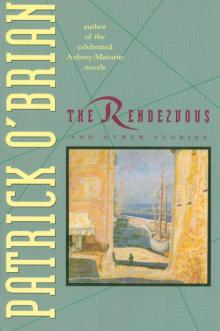 The Rendezvous and Other Stories
The Rendezvous and Other Stories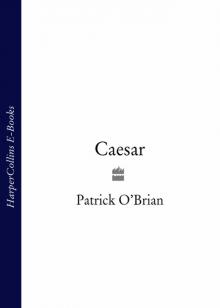 Caesar: The Life Story of a Panda-Leopard
Caesar: The Life Story of a Panda-Leopard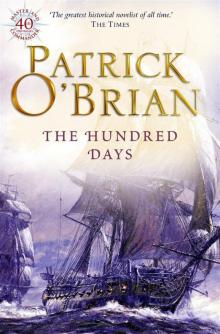 The Hundred Days
The Hundred Days The Yellow Admiral
The Yellow Admiral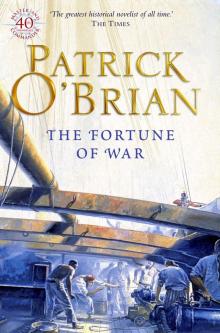 The Fortune of War
The Fortune of War The Mauritius Command
The Mauritius Command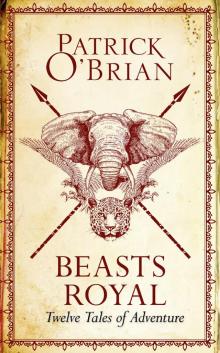 Beasts Royal: Twelve Tales of Adventure
Beasts Royal: Twelve Tales of Adventure A Book of Voyages
A Book of Voyages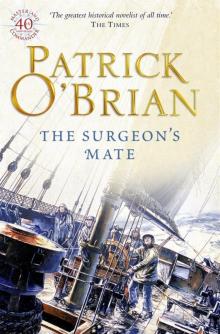 The Surgeon's Mate
The Surgeon's Mate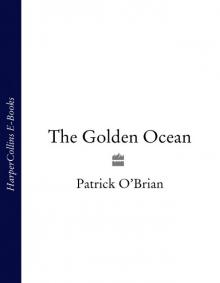 The Golden Ocean
The Golden Ocean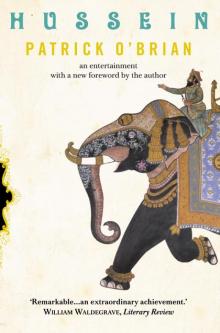 Hussein: An Entertainment
Hussein: An Entertainment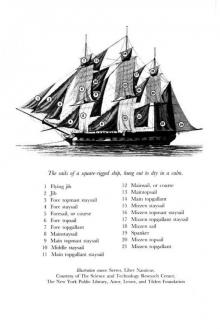 H.M.S. Surprise
H.M.S. Surprise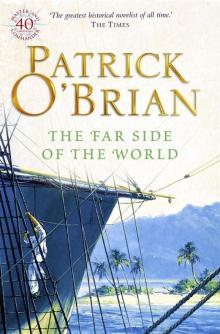 The Far Side of the World
The Far Side of the World Blue at the Mizzen
Blue at the Mizzen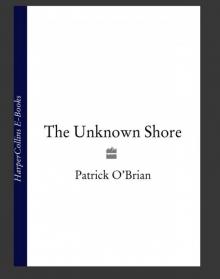 The Unknown Shore
The Unknown Shore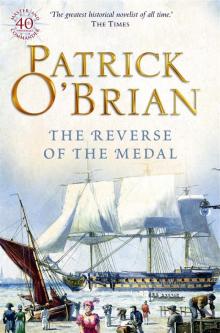 The Reverse of the Medal
The Reverse of the Medal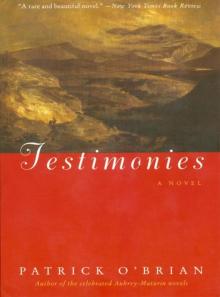 Testimonies
Testimonies Master and Commander
Master and Commander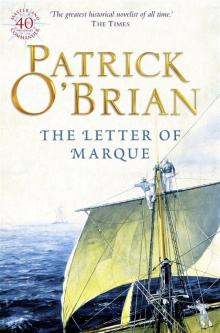 The Letter of Marque
The Letter of Marque Treason's Harbour
Treason's Harbour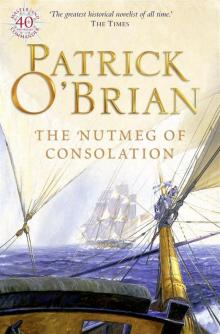 The Nutmeg of Consolation
The Nutmeg of Consolation 21: The Final Unfinished Voyage of Jack Aubrey
21: The Final Unfinished Voyage of Jack Aubrey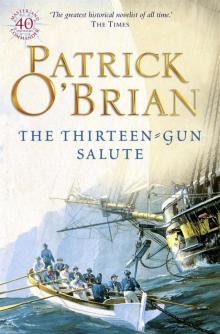 The Thirteen-Gun Salute
The Thirteen-Gun Salute The Ionian Mission
The Ionian Mission Men-of-War
Men-of-War The Commodore
The Commodore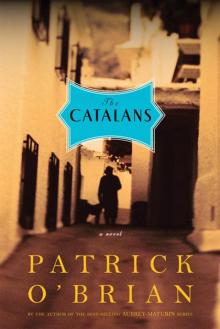 The Catalans
The Catalans Aub-Mat 08 - The Ionian Mission
Aub-Mat 08 - The Ionian Mission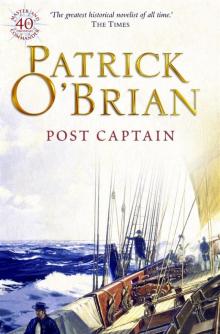 Post Captain
Post Captain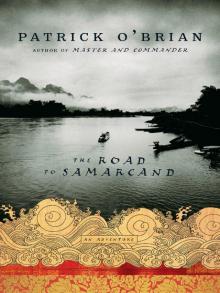 The Road to Samarcand
The Road to Samarcand Book 20 - Blue At The Mizzen
Book 20 - Blue At The Mizzen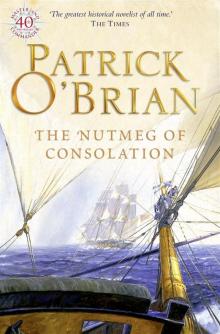 Book 14 - The Nutmeg Of Consolation
Book 14 - The Nutmeg Of Consolation Caesar
Caesar The Wine-Dark Sea
The Wine-Dark Sea Book 8 - The Ionian Mission
Book 8 - The Ionian Mission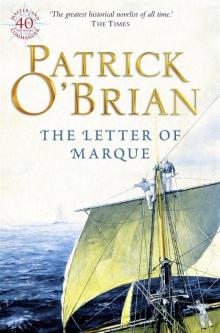 Book 12 - The Letter of Marque
Book 12 - The Letter of Marque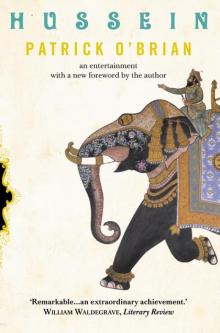 Hussein
Hussein Book 9 - Treason's Harbour
Book 9 - Treason's Harbour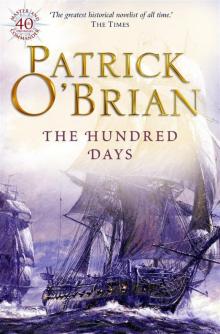 Book 19 - The Hundred Days
Book 19 - The Hundred Days Master & Commander a-1
Master & Commander a-1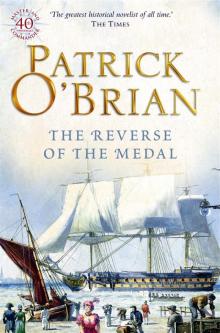 Book 11 - The Reverse Of The Medal
Book 11 - The Reverse Of The Medal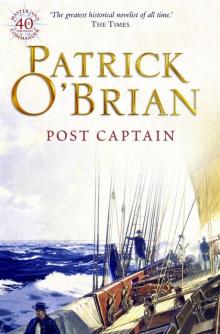 Book 2 - Post Captain
Book 2 - Post Captain The Truelove
The Truelove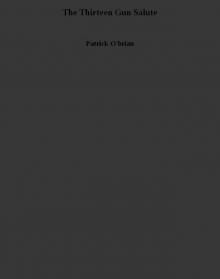 The Thirteen Gun Salute
The Thirteen Gun Salute Book 17 - The Commodore
Book 17 - The Commodore The Final, Unfinished Voyage of Jack Aubrey
The Final, Unfinished Voyage of Jack Aubrey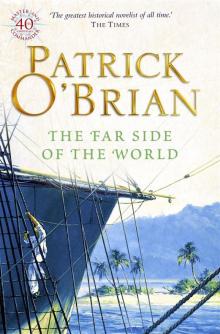 Book 10 - The Far Side Of The World
Book 10 - The Far Side Of The World Book 5 - Desolation Island
Book 5 - Desolation Island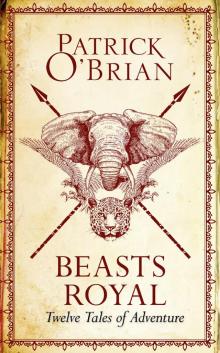 Beasts Royal
Beasts Royal Book 18 - The Yellow Admiral
Book 18 - The Yellow Admiral Book 15 - Clarissa Oakes
Book 15 - Clarissa Oakes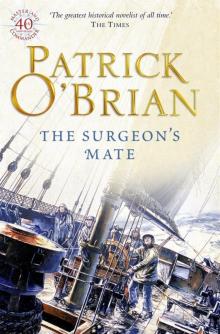 Book 7 - The Surgeon's Mate
Book 7 - The Surgeon's Mate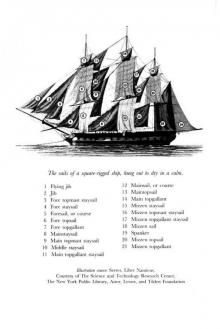 Book 3 - H.M.S. Surprise
Book 3 - H.M.S. Surprise Desolation island
Desolation island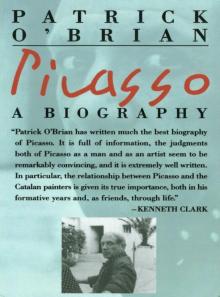 Picasso: A Biography
Picasso: A Biography Book 4 - The Mauritius Command
Book 4 - The Mauritius Command Book 1 - Master & Commander
Book 1 - Master & Commander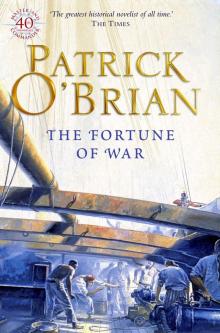 Book 6 - The Fortune Of War
Book 6 - The Fortune Of War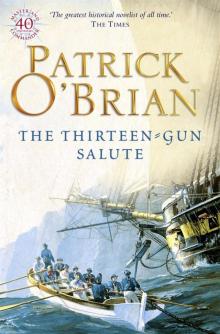 Book 13 - The Thirteen-Gun Salute
Book 13 - The Thirteen-Gun Salute Book 16 - The Wine-Dark Sea
Book 16 - The Wine-Dark Sea